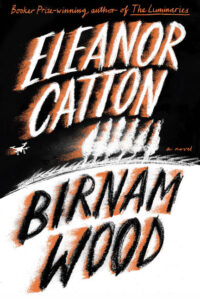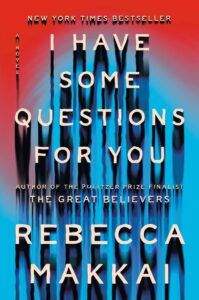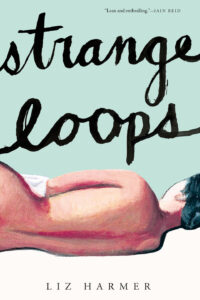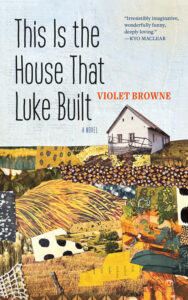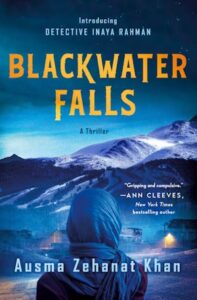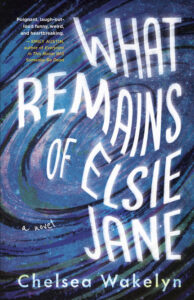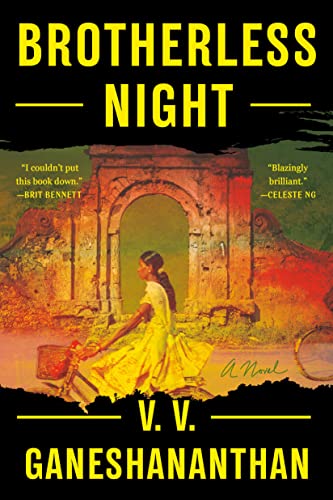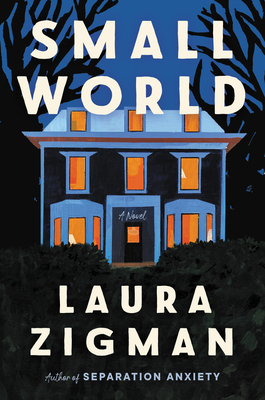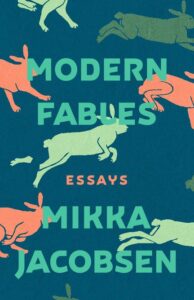April 17, 2023
Birnam Wood, by Eleanor Catton
True confession time: I’ve never read Eleanor Catton’s Man Booker Prize-winning novel The Luminaries, and I likely never will. Reportedly, it’s very lengthy, set a long time ago, and all about a man staking his claim in a gold rush (yawn), and no doubt it’s extraordinary and brilliant, but each of these makes for three counts on my NOPE NOPE NOPE list, and there are so many other books in the world.
My interest in Catton’s latest Birnam Wood, however, was piqued by critic Lauren Leblanc’s enthusiasm for the project, which was also the reason I went to see Catton at the Toronto Public Library’s Bluma Salon event in early March, which was really fantastic, and I bought the book there. She kept talking about plot, and about how “character is action; we are what we do,” and I was intrigued, though I’ve got to say that even though this novel clocks in at only just over 400 pages, I picked it up thinking of a doorstop, and what have I gotten myself into? There was not a lot of white space. Will I be reading this novel for the next 900 years?
But reader, I sped through it in two days. This book! This book! Speaking of plot… Though it didn’t take off immediately. I was interested in the story and surprised to find that it was so much more intimate and immediate than I was expecting, deeply embedded in the experiences of characters ranging from the leader of the gardening collective, her loyal sidekick, a renegade citizen journalist, a pest-control mogul who has recently received a knighthood, his wife, and a reclusive American billionaire seeking refuge in middle of nowhere New Zealand for reasons that aren’t bound to be honourable. I thought this would be a more sprawling book, individual people at a distance, more a book in general than this one, which is so exactly, specific. Even though the paragraph-long sentences were hard to parse at first, so many clauses, and semi-colons. Like making one’s way through the weeds and the bramble, and then suddenly there I was at the heart of things and the novel was unputdownable.
“She was still looking for a villain. She was still trying, desperately—and uselessly—to find somebody more monstrous and despicable than her.”
Who is the villain of this story? Who is the hero? Such murky distinctions (if any are to be made) are what make Birnam Wood such a fascinating puzzle of a story. I loved it.
March 17, 2023
I Have Some Questions for You, by Rebecca Makkai
There were some moments in which I felt, reading I Have Some Questions for You, that perhaps Rebcca Makkai was trying to squeeze too much into this book. A novel 400+ pages long, a campus novel, murder mystery, #MeToo/cancel culture moral reckoning, Anti-Black racism and how the justice system is far from just for people of colour. Plus a treatise on true crime podcasts, because Mekkai’s narrator Bodie Kane is a podcaster too, in addition to being a film professor, and she casually rattles off old crime cases: “Wasn’t it the one where she was stabbed in—no. The one where she got in a cab with—different girl. There one where she went to the frat party, the one where he used a stick, the one where he used a hammer…” A story that’s specific and unspecific at once, positively amorpheous.
The specific part of the story is about Bodie returning to the scene of the crime in 2018, which is to say high school, which was, in her case, a mid-grade New Hampshire boarding school she’d been sent to in the 1990s by a benefactor after horrific tragedy had befallen her family in Indiana. Those years were, as high school always is, complicated, Bodie conscious of herself as an outsider, and then, in her senior year, her roommate from the year before is murdered. The school’s athletic assistant was found guilty, and he also happened to be one of the few Black people on campus. By 2018 and deeply steeped in true crime podcasts, Bodie is already mildly obsessed the case as she comes back to Granby to teach seminars on podcasting and film history.
At the same time, her husband (they’re separated; he lives next door/ they get along fine) is being cancelled on Twitter by a somewhat insufferable performance artist, and Bodie is slowly being undone by the complexity of these matters: what is the distance between what her ex is alleged to have done and other instances the prompted us all to #BelieveWomen, plus the absolute bullshit she and her peers had to put up with with in high school from male teachers, and even from each other as rumours spread (but then some of these rumours are what protected students from abusers—how do you ever know what/which women to believe?).
It’s been a busy week and I’ve not had as much time to read this book as I would have liked, to give it the focus it really deserved, so that I could get lost in it, but last night I sat down for a couple of hours to finish it and finally everything clicked, the over-stuffedness, the real answer to whodunnit:
“My point is, you were part of the machine… You drove the getaway car. You threw bricks through the window and someone else grabbed the jewelry. You distracted the feds while the spies got away You held her down while someone else beat her. You shot the deer and wounded it; when the second hunter came along, the deer could no longer run.”
What a marvelous, absorbing, complicated world of a book this is, a literary mystery, and a mirror.
February 28, 2023
Strange Loops, by Liz Harmer
Exquisite and propulsive are the first two words that spring to mind when I think about Liz Harmer’s latest novel, Strange Loops, which I read this weekend and found virtually unputdownable. It’s the story of Francine, a high school teacher involved in an inappropriate relationship with a former student, who is now 18, the power dynamics at play inversely reminiscent of a relationship Francine had during her own teen years with a charismatic pastor at the church Francine’s twin brother Philip had started attending, a church that Francine had followed him to, though she was never the believer that he was, perhaps the reason he’s been angry at her for decades.
The novel moves between three timelines with Philip and Francine’s respective points of view: high school era, present day when both are married with children in their thirties, and a cataclysmic family vacation five years before that during which a storm blew in and everything the twins had been repressing for decades finally exploded to the surface. Are the “strange loops” the two are caught in destined to repeat forever? Does Philip know about Francine’s relationship with her former student? Will he tell her husband? And how does their mother’s own history factor into all this, a small but essential question whose answer is vital to this novel’s tremendous power?
Last summer a Canadian journalist published a misguided memoir that became more than a bit notorious after the fact, a strange and unthoughtful work of revenge, the kind of memoir one might more often encounter in torrid fiction than real life, a book that was mostly remarkable for the questions it posed instead of any of the conclusions it came to. And if that strange memoir had been an excellent novel, it could have been this one, an unsettling story of doubleness, the messiness and irresolvability of power dynamics, and what it means to be a woman who wants, who desires.
February 23, 2023
This is the House That Luke Built, by Violet Browne
I don’t really know where to start with this book, this brutal, gorgeous, funny, strange and loving story of loss and living, though there is an obvious comparison in terms with subject matter with Lisa Moore’s February, but Violet Browne’s This is the House That Luke Built—fiction born of the author’s own experience—is something altogether its own. Something that, I must confess, I don’t *get* in its entirety, but I’m going to speculate that this is the point, that there are element of Rose’s experience of loss and widowhood that are unfathomable to me, the same way that, I suppose, I once read Rachel Cusk’s A Life’s Work before I’d had children and missed the point altogether.
The novel is told in a series of vignettes moving back and forth through time, showing Rose early in her relationship with Luke as, with her two children and his son, they come together and make a family, baby Emily arriving not long after. We see Emily in 2013: “Every since her father vanished when she was fifty-three days old, Emily’s body has been gripped by a vibration at the molecular level,” an urgency she tries to satiate with tattoos, piercings, as she tries to settle with what was lost to her. 1994, as Luke’s boat goes down in a storm. 1980 with Rose in her father’s boat as a child, in Plancentia, NL.
Mostly though, these vignettes tell the story of Rose trying (and often failing) to pick up the pieces of her family life after Luke’s death, how time marches on, how her parents and her sister keep her going, as do her children, with their own needs and particular wounds that become clearer over time. But she ends up eking out some kind of a deal with the fates, that every year on the anniversary of Luke’s death, Rose gets to walk through the wall of the house he’d built for their family and find him waiting there for her, though it’s a deal she must pay dearly for—in exchange, she’s aging faster, losing years of her life, her teeth decaying, her skin losing its definition. Until eventually she’s asked for too much…
I love this book, just as heartbreaking as it is hilarious, full of gorgeous prose, and gutsy women, and so much love, even in the face of so much loss, maybe especially. Rose’s struggles to raise her kids and make a better life for herself are harrowing and awesome, and the flame that continues to burn for the husband she lost is sustaining, transformative, unforgettable.
February 21, 2023
Blackwater Falls, by Ausma Zehanat Khan
Blackwater Falls launches a new mystery series by Ausma Zehanat Khan, whose Esa Khattak/Rachel Getty books I enjoyed very much, this new series set in Colorado, where British-born Canadian Khan now makes her home, and with Detective Inaya Rahman at the helm. This is a novel very aware of itself as a police procedural post-2020, just as Rahman herself is aware of her complicity as part of a system that neither serves nor protects people of colour.
And it’s not just (B)lack and white, literally, or otherwise. Detective Rahman, a member of the police’s Community Response Team, is brought in after the body of a teenage girl, Razan, a Syrian refugee, is found murdered and bizarrely displayed at the entrance to her mosque in the rural town of Blackwater Falls, CO. A gang of menacing bikers linked to the local Evangelical church lend an aura of menace to the case, plus a local Black activist is furious that this one murdered teen is garnering so much attention, while two other cases of Muslim teens missing from the local Somali community have not even warranted an investigation, have been shrugged off as merely runaways.
Detective Rahman has to gain the trust of local Muslim communities, work toward finding Razan’s killer, tiptoe around the local Sheriff with white supremacist leanings, and also make sense of her superior, Detective Waqa Seif, who keeps obstructing her investigation in curious ways—is he working for the Sheriff, perhaps, or is there some other secret that he’s hiding?
Meanwhile, Detective Rahman is still dealing with PTSD from a violent assault by her police colleagues at her previous job in Chicago, a retaliation for her efforts to hold an officer to account for the killing of a Black man at a traffic stop. And Khan’s depiction of this assault, told through a flashback, was one of the most devastating, affecting bits of fiction I’ve encountered in a book lately—some readers may want to take care.
This novel by Khan—who holds a PhD in international human rights law—is very much a story of our time, from white supremacy, police brutality, Black Lives Matter, border policy, refugee struggles and more, right down to the inhumane working conditions in meatpacking plants that has resulted in so much death due to Covid-19 over the last three years. And yet this isn’t a book that gets bogged down in the issues, perhaps because Khan goes out of her way to have her story show the interconnectedness of all of these ideas and the way they affect people’s lives and communities. The stakes—both in the novel and in reality—are huge.
February 6, 2023
What Remains of Elsie Jane, by Chelsea Wakelyn
Chelsea Wakelyn’s debut novel WHAT REMAINS OF ELSIE-JANE reads a bit like Joan Didion’s THE YEAR OF MAGICAL THINKING, but narrated by someone who is not a cool customer, instead a human being wracked with pain and grief and lust and longing after the death of a partner from drug poisoning, a loss that has left Elsie Jane with a backyard full of weeds, an addiction to dating apps, and two small children who need feeding and caring day-after-day, and Elsie Jane is hanging on, just barely. Or not really at all…but then she decides to contact a space-time wizard via Craigslist who can help her return to the dimension where Sam lives and Elsie Jane’s life was still whole and functioning, and her biggest struggles were with Sam’s drinking and also the grief she carried from the deaths of her parents, back when she thought that constituted “the worst.”
This novel about death just pulses with life, with a force as compelling as the one that kept me turning the pages. It reminded me a lot of Rebecca Woolf’s memoir ALL OF THIS, about a complicated widowhood, brutally honest and beautifully human. I absolutely adored it.
February 2, 2023
Brotherless Night, by V.V. Ganeshanathan
In her novel Brotherless Night, V.V. Ganeshananthan writes about the way that Tamil fighters would take over ordinary homes in 1980s’ Sri Lanka, during that country’s brutal, decades-long civil war, and how, when they were finished with these spaces, they’d leave them laden with traps and mines, which seems like an appropriate metaphor for what such tumult, violence and devastation from civil war does to the notion of home in general. Though I suspect Ganeshananthan’s protagonist, Sashi, would have something to say about my employment of metaphor at all, about my liberty to have one thing stand for another, war being, for me, an abstract concept, which is something Sashi doesn’t take for granted in her telling: “Imagine the places you grew up, the places you studied, places that belonged to your people, burned. But I should stop pretending that I know you. Perhaps you do not have to imagine. Perhaps your library, too, went up in smoke.”
I learned so much from Brotherless Night, a story whose title comes from Sashi’s loss of her revered elder brothers to violence and also from how even those with loyalty to the cause of Tamil freedom were used and made to suffer in its name. And while the specifics of the political events, between 1980 and 1989, were new to me, the overall narrative is a familiar one—of people yearning for liberation, about noble causes hijacked by ego and violence, and how women are always collateral damage in war, the ways in which their suffering, by some, is simply expected.
When the story begins, Sashi is dreaming of becoming a doctor, following her elder brother in this dream, and her greatest hardship is that her father has forbidden her and her brothers to ride their bicycles against the backdrop of political tension. And as the tension builds and violence and ensuing traumas begin to rob Sashi of her innocence and her youth, ordinary life proceeds as best it can—when most electricity is no longer functioning in Jaffna, Sashi and her medical school colleagues gather by the hospital with their school books to study under the outdoor lights there.
Eventually Sashi takes a job working in a Tigers field hospital, dismayed by what their cause has done to the boys she’s grown up with, including her own brothers, but also feeling obligated to offer care to any person who needs it. All the while, however, she works with her charismatic feminist professor to keep an apolitical record of atrocities committed by all sides in this complicated conflict, which means that eventually her protection by the Tigers is compromised.
As much as Sashi’s story itself was fascinating and illuminating for me, however, it’s the way she tells it that is the most compelling aspect of the narrative, instances of direct address (such as the passage about the burning library above), her evasions, her unwillingness to choose definitiveness, and also her acknowledge of how language and translation complicates and obscures—the nuances of Tamil that cannot be conveyed in English, all those parts of this story that those of us reading from a distance will never actually understand.
Beautiful, devastating, brutal and meticulous at once, Brotherless Night is a read that’s unforgettable.
January 27, 2023
Small World, by Laura Zigman
I’ve never read Laura Zigman before so I don’t really know what I was expecting with her new novel, Small World, which is weird, because I’d read her interview with Lauren LeBlanc, what turned me onto the novel in the first place, so I knew that this was a story of a divorcee on the cusp of 50 whose sister moves in with her after many years of a continent between them, and that their coming together again prompts a reevaluation of a childhood spent in the shadow of their sister Eleanor, who was born in between them and lived with disabilities until her death which led to the end of their parents’ marriage and their mother’s fervid mix of despair at this loss and years of activism in a fight for disability inclusion.
But I didn’t know how such a book could turn out to be so funny, how sisters Joyce and Lydia could turn out to be both be so difficult (with each other, and the world in general) in such different ways, and how this story that weaves back and forth between the sisters’ childhood and the present day could be so perfectly complemented by the inclusion of found prose poems Joyce has taken from posts on a Neighbourhood app called Small World, similar to Nextdoor:
INCONSIDERATE NOISE
I’ve lived on what used to be
a quiet street in
West Cambridge
I say “used to” because
recently
two families with young children
moved in
and destroyed the peacefulness of the street…
The tension between Joyce and Lydia remains unaddressed until the arrival of new upstairs neighbours operating a yoga studio/wellness centre above their living room forces things to a head, Joyce frustrated by the neighbours’ lack of adherence to rules and general decency, and by Lydia’s lack of support as she tries to resist their friendly overtures, and things between them get even weirder and uncomfortable, but their childhoods made for weird and uncomfortable, for them, a most familiar terrain, and it’s here where they finally begin to understand how much they lost and also never really realized they had during the years they had Eleanor and afterwards.
This is a novel about inclusion on all kinds of levels, about how both sisters felt removed from their mother’s connection to Eleanor, and from the family life that had Eleanor’s care at the centre, and about what community means and what family means and the impossible standards people (mothers in particular) are forced to live up to, and those miraculous people who see us, who save us.
January 16, 2023
Modern Fables, by Mikka Jacobsen
Modern Fables started out strong and never quit, a collection of personal essays that begin with a wake (with whisky, which leads to a brawl) and concludes with a wedding (with watermelon vodka-cocktails, which leads to Jacobsen fucking the best man, and the dissolution of her friendship with the bride). And in between, a wide of stories that take no sides, but instead examine every side—on sports and mascots (you can read an excerpt at 49thShelf); about a white Albertan’s relationship to the Indigenous peoples upon whose land she lives (complicated by her psychologist mother’s shamanism); such an artful revenge essay on a shitty ex-lover who turns out to be a plagiarist but which is also a treatise on women’s work and textile arts, and Mrs. Ramsay’s brown stocking.
In “Kurt Vonnegut Lives on Tinder,” Jacobsen notes how an affinity for the Slaughterhouse Five author is shorthand for something on the popular hook-up app, and resolves to figure out just what that means. “Modern Fables” tells the story of a relationship with a seeming pathological liar, and also catfishing, and cats, and rabbits, and other dead household pets. “Me vs. Brene Brown” is another story of a love story gone sour, in this case between Jacobsen and Brown’s ideas about been empathy and shame, which seem revolutionary at first, but Jacobsen soon realizes she’s read something like them else before (oh, yeah, right, in almost every work of literature ever, not least of all The Scarlet Letter), not to mention how Brown’s work seems to preclude the possibility of a fulfilling life outside of a nuclear family, and what Brown’s folksiness might suggest about what she thinks of the intelligence of her readership. And finally, “David Silver,” taking on the 90210 actor and other notable Davids (including he who battled Goliath) in a rich and provocative piece on mental illness, convening with the spirit world, and the possibility of cosmic order.
I loved this book, a collection that relit my flame of passion for the personal essay, a collection up there with Susan Olding’s two, which are some of the finest in CanLit—in Freehand Books, Jacobsen and Olding share a publisher. These essays are gorgeous, brutal, stunningly crafted, and pack a punch, like a one-two, WHAM, and then another, and then another, you’re sad when it’s all done.
December 8, 2022
Ducks: Two Years in the Oil Sands, by Kate Beaton
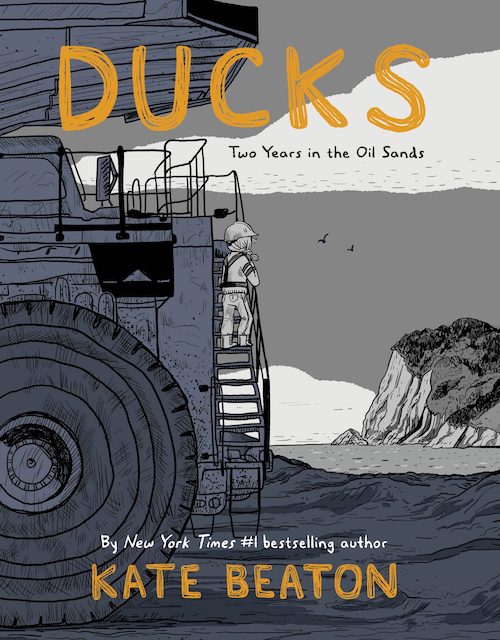
In October I went to see Kate Beaton present her graphic memoir Ducks: Two Years in the Oil Sands at the Art Gallery of Ontario, and the force of that presentation kind of made the book itself beside the point, hence the reason I’m posting about it two months later, but it’s still on my mind.
Before Kate Beaton made a name for herself drawing ridiculously clever comics inspired by classic literature and history, she was an arts grad from Cape Breton, Nova Scotia, with student loans to pay off and little opportunity for lucrative employment, and certainly not anywhere near her home, from which people have been leaving to find work since even before the coal mining industry went bust. In her AGO presentation (the most riveting, hilarious, generous, and vulnerable author talk I’ve ever been to, complete with music and singing), Beaton talked about her grandfather travelling to the prairies to find work as a farmhand, decades before her own journey west. She talked about what it does to a place to be robbed of its people and connections, and what it does to a self to belong to a place where you’re taught that a future isn’t possible.
In the early 2000s, Beaton moved to Alberta for well-paid work in the oil sands, and it was a strange and lonely existence rife with contradictions, which she captures beautifully in Ducks. Lonely and never alone, out of place but surrounded by people she recognizes as like those from home, earning money but nothing to spend it on, small in an immense awe-inspiring landscape being desecrated by industry.
Beaton’s drawings are composed in shades of grey, which is fitting for a story with such nuance. While Beaton doesn’t shy away from showing the reality of such a peculiar social environment, that women suffer in places like this, she also shows that the suffering isn’t limited, and that people being forced to travel far from home for work that is soul-destroying, not to mention ecologically devastating, are suffering too, and the real culprit is capitalism, a system that devalues people and communities, a system that pushes people to the point of breaking.
Beaton’s dream is to work in museums, putting her degree to good use, and she gets her break after a year in the oil sands, which she leaves for a part time position at a marine museum in Victoria…which turns out to barely be enough to live on, let alone pay off her loans, and so Beaton returns for another year in the Oil Sands, but here she begins publishing her comics on her Livejournal, pieces that would become Hark A Vagrant, from which Beaton would make her name, become a bestselling author, and (that rarest of things) an artist able to earn a living from her work. After a stint as a New York art sensation, Beaton once again lives in Cape Breton.
A happy ending then, but Kate Beaton is truly one in a million, and in the years since her time in the oil sands, she hasn’t forgotten what she saw, and what she learned. About humanity in the midst of inhumanity, and the worthiness of ordinary people to live good lives in the places where they come from. It’s not black and white, and that’s why Ducks is worth reading.
